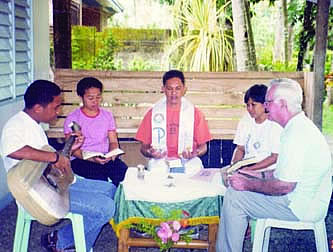Of Goodness and Courage
Living priesthood among the poor in the Philippines is a continuing challenge and a daily invitation to conversion
By Fr. Pat Kelly, S.F.M.
January 2004
Return to Table of Contents
Print Article
The chapel leader wanted to continue presiding over the Sunday community prayer. He had been prayer leader for five years, but he would not listen to the advice and suggestions of others and always believed that he was right. The community informed him that they did not want him to continue. They would not give him the recommendation so that he could participate in the yearly renewal week for prayer leaders.
The above is a small example of a new way of being Church that started over 30 years ago in the central and southern part of the Philippines. Many foreign mission societies at that time, Scarboro Missions included, made the formation of Basic Christian Communities their priority. The vision that energized us was that of neighbours, families, coming together because of their faith in Jesus Christ and reflecting on the Scriptures.

Fr. Pat Kelly (far right) celebrating Eucharist in Zamboanga Del Norte, Mindanao, with parish priest Fr. Atilano (Ati) Tabaraza, Michael, Mila and Lorraine. All are members of the follow-up team of the Redemptorist mission involved in developing lay leadership in Basic Christian Communities.
Within these communities the people could apply their sharing and insights to their own lived reality and connect this to the Gospel message. Over time, they better understood the words of the Our Father, "your Kingdom come." They understood that they were being called to be instruments of the coming Reign of God. The words "The Lord is with you" took on greater meaning.
The 70s and 80s were traumatic times in the Philippines: the Marcos dictatorship with its oppression and human rights violations; the Maoist New People's Army that drew many of its members and supporters from the poor; the worries, sadness and hardships arising from the people's life of poverty.
The basic Christian communities reflected on this reality. In no way was it an intellectual exercise, but one in which the oppression, fear and injustice seeped into the marrow of everyone's daily life. While sharing their insights, fears and hopes, there always remained the outstanding question: What is our response as Christians to this situation?
It took true courage to search for answers. Many responses were nonviolent actions of the communities witnessing against the killings, human rights abuses, and sufferings they endured because of their stance. Yet, in so many ways these were also grace-filled years for the emerging new Church.
If we fast forward to the present, many refinements have been made to the structure of the communities. The diocese where I work in Zamboanga Del Norte, Mindanao, is structured on the concept of Basic Christian Communities. All the ministries in the parish pastoral council as well as the diocesan structure itself are in each community. It is a grassroots Church-the communities in one village join together as chapels; the chapels join together as zones; the zones join together as parish.
On every level there is much to be thankful for and much to be desired. Although 70 percent of the communities meet each week, attendance fluctuates depending on other demands on the poor who make this commitment while struggling to eke out a living.
Within the communities, there are tensions between the need to pray and the need to take action for justice and peace. There are tensions between different personalities. There are tensions between the desire for freedom from money-lenders to whom the farmers sell their produce, and the fear of relying on themselves by developing alternatives such as cooperatives. There is also the tension between praying to a God who acts for us, and praying to a God who acts in and through us.
Half jokingly, I say that the full Reign of God is going to take another 28,000 more years. And so we are still pioneers, as it has been only 2,000 years since the birth of Christ.
But all through this journey there is much to celebrate. A tremendous change has taken place within the Catholic Church in this part of the world. It is a Church that speaks out for the poor, for justice and for human rights. It is a Church with a vibrant and committed laity who see themselves as the People of God.
Having firsthand experience of the daily life of the poor here in Mindanao-a life that would absolutely crush me-I am in awe of the goodness of the people. Living my priesthood here among them has become a continuing challenge and a daily invitation to conversion.
Return to Table of Contents
Print Article